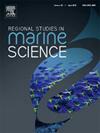Marine oil spill clean-up: A review on technologies with recent trends and challenges
IF 2.1
4区 环境科学与生态学
Q3 ECOLOGY
引用次数: 0
Abstract
Crude oil leakage occurs frequently during exploration, storage, transportation, production, and consumption. The spilling of crude oil has the potential to contaminate the ocean, soil, and groundwater. Oil spills during oil extraction and transportation, such as from drilling wells, rigs, transport tanks, and pipelines, are an important cause of extensive environmental damage because they significantly decrease the diversity of aquatic life and disrupt the biological equilibrium of the ocean. It also damages the world's energy economy. Cleaning crude oil spills from marine or ocean environments is a highly challenging task because of the spilt oil's properties and limited mobility to the accidental site. This article focuses primarily on the various technologies used in the cleanup of oil spillage in marine or ocean environments, as well as their recent trends and challenges. This research work begins with a discussion of the historical events and the primary roots of oil spills, the composition of the spilt oil, the effects they have on the surrounding environment, the governmental rules for oil spills, and methods for cleaning up marine oil spills such as physical, thermal, biological, and chemical are briefly covered along with their benefits and drawbacks. This work discusses the software and artificial intelligence-related technologies prevailing for oil spill modelling and their current limitations.
海洋溢油清理:最新趋势和挑战下的技术回顾
原油泄漏经常发生在勘探、储存、运输、生产和消费过程中。原油泄漏有可能污染海洋、土壤和地下水。石油开采和运输过程中的石油泄漏,如钻井、钻机、运输罐和输油管中的石油泄漏,是造成广泛环境破坏的重要原因,因为它们大大减少了水生生物的多样性,破坏了海洋的生物平衡。它还会破坏世界能源经济。由于泄漏原油的特性以及在事故现场的有限流动性,清理海洋或大洋环境中的原油泄漏是一项极具挑战性的任务。本文主要关注用于清理海洋或大洋环境中原油泄漏的各种技术及其最新趋势和挑战。这项研究工作首先讨论了溢油的历史事件和主要根源、溢油的成分、对周围环境的影响、政府对溢油的规定,并简要介绍了物理、热、生物和化学等海洋溢油清理方法及其利弊。本作品讨论了目前用于溢油建模的软件和人工智能相关技术及其目前的局限性。
本文章由计算机程序翻译,如有差异,请以英文原文为准。
求助全文
约1分钟内获得全文
求助全文
来源期刊

Regional Studies in Marine Science
Agricultural and Biological Sciences-Ecology, Evolution, Behavior and Systematics
CiteScore
3.90
自引率
4.80%
发文量
336
审稿时长
69 days
期刊介绍:
REGIONAL STUDIES IN MARINE SCIENCE will publish scientifically sound papers on regional aspects of maritime and marine resources in estuaries, coastal zones, continental shelf, the seas and oceans.
 求助内容:
求助内容: 应助结果提醒方式:
应助结果提醒方式:


